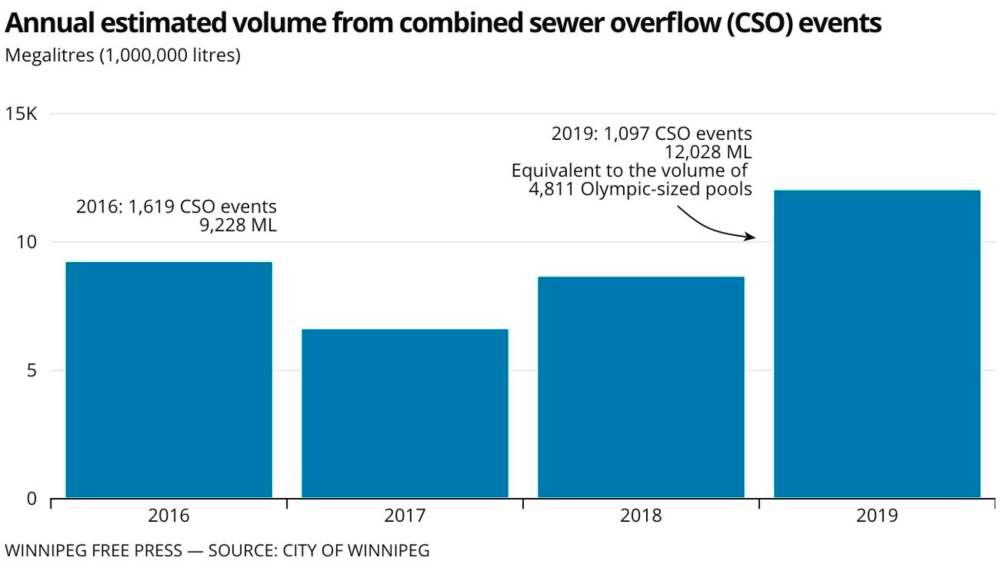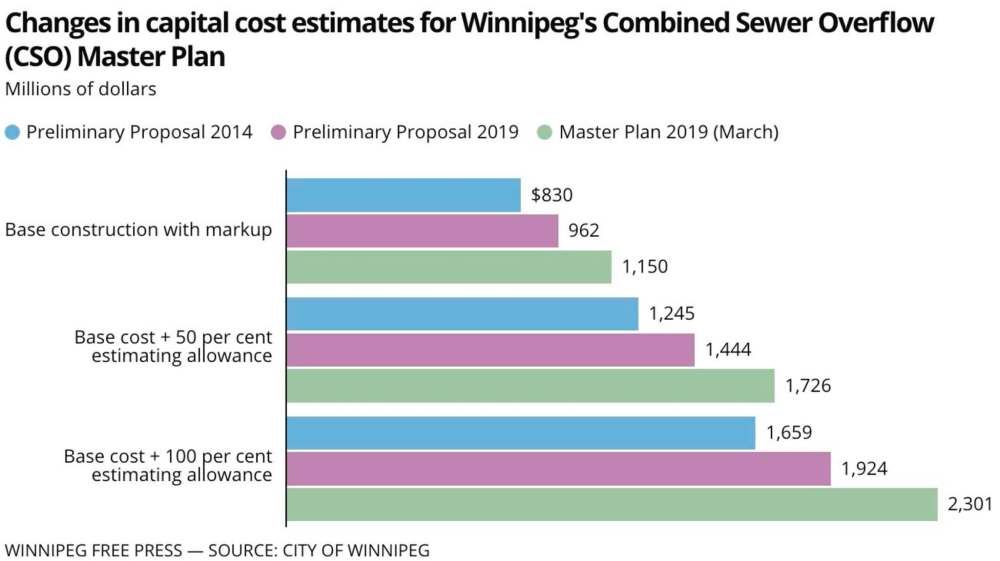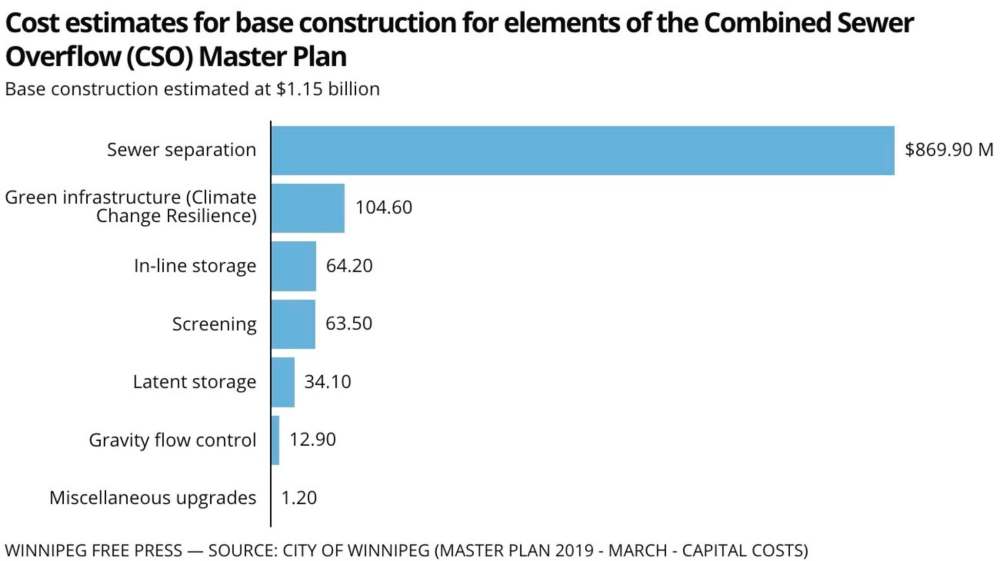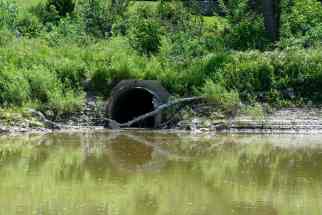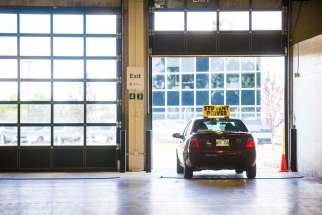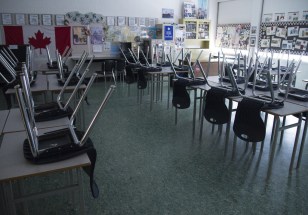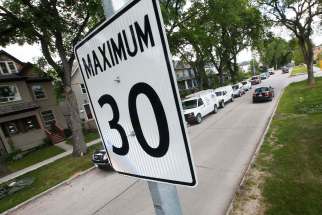Winnipeg 75 years away from replacing destructive combined sewers without financial help, city official says
Read this article for free:
or
Already have an account? Log in here »
To continue reading, please subscribe:
Monthly Digital Subscription
$0 for the first 4 weeks*
- Enjoy unlimited reading on winnipegfreepress.com
- Read the E-Edition, our digital replica newspaper
- Access News Break, our award-winning app
- Play interactive puzzles
*No charge for 4 weeks then price increases to the regular rate of $19.00 plus GST every four weeks. Offer available to new and qualified returning subscribers only. Cancel any time.
Monthly Digital Subscription
$4.75/week*
- Enjoy unlimited reading on winnipegfreepress.com
- Read the E-Edition, our digital replica newspaper
- Access News Break, our award-winning app
- Play interactive puzzles
*Billed as $19 plus GST every four weeks. Cancel any time.
To continue reading, please subscribe:
Add Free Press access to your Brandon Sun subscription for only an additional
$1 for the first 4 weeks*
*Your next subscription payment will increase by $1.00 and you will be charged $16.99 plus GST for four weeks. After four weeks, your payment will increase to $23.99 plus GST every four weeks.
Read unlimited articles for free today:
or
Already have an account? Log in here »
Hey there, time traveller!
This article was published 29/07/2020 (1960 days ago), so information in it may no longer be current.
More than 12 billion litres of diluted sewage flowed directly into local rivers last year, because of combined sewer overflows.
The overflows, or CSOs, occur in older sewers that collect both precipitation and wastewater in a single pipe. Heavy rain or snow events can cause them to overflow into the rivers.
That diluted sewage contains algae-promoting phosphorus and nitrogen, which eventually winds up in Lake Winnipeg.
Last year’s pollution from the spills greatly exceeds the 8.7 billion litres that overflowed during 2018.
Winnipeg water and waste officials say especially wet weather caused the 2019 increase, since 576 millimetres of precipitation fell last year, up from 379 in 2018.
“There’s a direct correlation (between) the amount of rainfall in the current system and the number of overflows,” said Geoffrey Patton, the department’s manager of engineering services.
The city is now spending about $30 million a year on its plan to reduce CSOs and faces a provincial deadline of Dec. 31, 2045 to capture 85 per cent of all overflows in an average weather year.
But it could take several decades to get that work done. Reducing combined sewer overflows is expected to cost up to $2.3 billion. That means the city can’t realistically afford to meet the deadline, according to Patton, unless the provincial and federal governments help pay for it.
“All of this (so far) is being paid by water and sewer ratepayers within the City of Winnipeg… this is what we believe is affordable for ratepayers,” he said.
A city chart states the project could be finished by 2095, if the city funds the work alone at its current rate. It estimates completion would speed up to 2059, if one other level of government matched its annual investment, or 2047 if both the province and feds matched funding.
“We’re going as fast as we can go with the funding that we have in place,” said Duane Griffin, Winnipeg’s branch head for wastewater planning and project delivery.
Other levels of government haven’t made funding commitments to the project yet, Griffin said.
But Coun. Brian Mayes, the city’s water and waste chairperson, said Winnipeg should strive to ensure the 2045 deadline is met.
“It’s a good environmental initiative. I’m not going to sit here and say we need decades more,” said Mayes (St. Vital).
The councillor said he’d like to secure funding from other levels of government for the project but believes the city should also consider raising water and sewer rates to help pay for the work, if that’s needed.
“It might be necessary. At some point, we have to do this; 2095 seems unimaginably (far away),” he said.
Vicki Burns, director of the Save Lake Winnipeg Project, said all governments must begin to view the health of Lake Winnipeg as a critical concern and invest in sewage upgrades that protect it.
“When there is something that’s seen as critical, we can come up with the money. And the state of Lake Winnipeg should be seen as really critical,” she said. “It impacts hundreds of thousands of people who live around the lake and use the lake for vacation purposes.”
Burns said the pollution should also be acknowledged as a health concern, since algae can contain toxins.
“I think the whole thing really needs to be worked on, otherwise we’re going to see more and more serious problems with Lake Winnipeg, including serious health risks to people and all life that depends on it,” she said.
In an emailed statement, a provincial spokesperson called it “premature” to discuss if the 2045 CSO reduction deadline could be extended.
Joyanne.pursaga@freepress.mb.ca
Twitter: @joyanne_pursaga

Born and raised in Winnipeg, Joyanne loves to tell the stories of this city, especially when politics is involved. Joyanne became the city hall reporter for the Winnipeg Free Press in early 2020.
Our newsroom depends on a growing audience of readers to power our journalism. If you are not a paid reader, please consider becoming a subscriber.
Our newsroom depends on its audience of readers to power our journalism. Thank you for your support.

